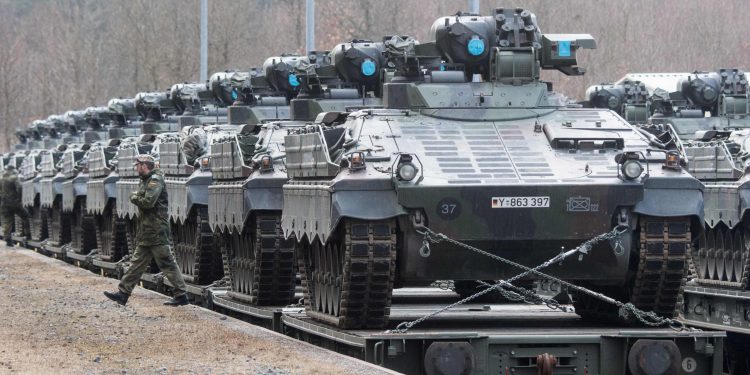Ukraine’s Foreign Minister Dmytro Kuleba on Thursday called on NATO members to provide Kyiv with all the heavy weaponry it needs to fight Russia’s invading forces.
“My agenda is very simple. It has only three items on it. Its weapons, weapons, and weapons,” Kuleba told journalists ahead of a meeting with NATO foreign ministers in Brussels.
“I call on all allies to put aside their hesitations, their reluctance, to provide Ukraine with everything it needs,” he said.
Ukraine is pushing the West to increase its arms supplies with heavier weaponry, including air defence systems, artillery, armored vehicles and jets, as Moscow refocuses its offensive on the east of the country.
Kuleba said economic powerhouse Germany “can do more” as he criticized allies that remain reluctant to send so-called “offensive” arms.
“This distinction between defensive and offensive doesn’t make any sense when it comes to the situation in my country,” Kuleba said.
“Those countries who are saying we will provide Ukraine with defensive weapons, but we are not in a position to provide them with offensive weapons — they are hypocritical, this is simply unfair, unjustified approach.”
NATO has refused to send troops to intervene in the fighting in non-member Ukraine, but has been sending crucial weaponry including anti-tank and anti-aircraft missiles.
“I think the deal that Ukraine is offering is fair. You give us weapons, we sacrifice our lives, and the war is contained in Ukraine,” Kuleba said.
‘Defensive war’
NATO chief Jens Stoltenberg said he was certain that allies would “address the need for more air defence systems, anti-tank weapons, lighter, but also heavier weapons and many different types of support to Ukraine”.
“Ukraine is fighting the defensive war. So this distinction between offensive and defensive weapons doesn’t actually have any real meaning,” Stoltenberg said.
The NATO chief said earlier that allies need to take advantage of a window of several weeks to supply weaponry now as Moscow repositions and rearms its forces for another major offensive in eastern Ukraine.
Germany’s Foreign Minister Annalena Baerbock told reporters Berlin was “looking closely with our partners how we can support Ukraine in the future, more intensively and more coordinated because they have a right of self-defence.”
NATO allies do appear to be heeding the call to step up the weapons being sent to Ukraine.
According to Czech media reports, Prague has sent Soviet-made T72 tanks and armoured vehicles to Ukraine , the first country to do so.
Czech officials have refused to confirm the move.
Alongside arms deliveries to Ukraine, the West has imposed a barrage of sanctions on Moscow aimed at battering Russia’s economy.
Kuleba welcomed a fresh wave of sanctions announced by the US, Britain and EU in the wake of revelations of killings in the town of Bucha, but insisted Europe especially must go further.
“We will continue to insist on full oil and gas embargo for Russia,” Kuleba said.
“I hope we will never face a situation again, when to step up the sanctions pressure we need atrocities like Bucha to be revealed.”
The EU is currently finalising its fifth round of sanctions, including a proposed ban on imports of Russian coal.
The bloc’s foreign policy chief Josep Borrell said he thought measures against Russian oil would be discussed by EU foreign ministers at a meeting on Monday.
“Sooner or later, I hope sooner, it will happen,” he said.
Foreign ministers from the G7 group of most industrialised nations were to also meet at NATO headquarters on Thursday to coordinate the Western sanctions.










